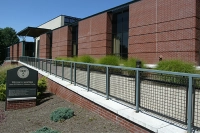School Psychology Educational Specialist (Ed.S.)
Fully Accredited
Marywood University is accredited by the Middle States Commission on Higher Education (MSHE). / ADDRESS / 3624 Market Street, 2nd Floor West, Philadelphia, PA 19104. | Phone: (267) 284-5000
The Educational Specialist (Ed.S.) in School Psychology is an Approved Graduate Preparation Program in School Psychology by the Pennsylvania Department of Education. We are one of 13 graduate preparation programs in school psychology approved by the state, and are currently applying for Candidacy with the National Association of School Psychologists (NASP) which is the first step in applying for accreditation as a nationally accredited program.
- Undergraduate Core Curriculum
- Curricular and Co-Curricular Guides
- Academic History
- Student Learning Outcomes
MISSION STATEMENT
The mission of the graduate program in school and clinical mental health counseling is to train master’s-level students to be ethical and caring decision-makers who attend to the varied developmental needs of individuals in Pre K-12 educational and clinical mental health settings. Housed in a comprehensive regional institution steeped in the Catholic tradition, the Marywood counseling program, its faculty and curricular experiences, inspire and transform students to learn, lead and serve in a diverse and changing world. Within this context, the education of the whole person is paramount. The standards-based curriculum is rigorous; faculty expectations are high; and students are challenged to understand and apply the ethical dimensions of personal and professional life and to examine their own attitudes, values and beliefs. Bearing this in mind, while endeavoring to synthesize and integrate the general education and the professional preparation of its prospective counselors, the Counseling Program faculty adopts the following program objectives:
COUNSELING PROGRAM OBJECTIVES
- To exhibit ethical professional behavior, skills, and dispositions consistent with the ACA and its affiliate standards in order to assume the role of professional counselors in school and clinical mental health settings.
- To acquire sufficient knowledge and skills to effectively provide individual, group, and outreach to meet the various concerns of diverse populations in clinical mental health and school settings.
- To exhibit professional leadership and advocacy skills necessary to serve as effective agents of change and advance the cause of diverse and underrepresented groups. Likewise, to develop a mastery of consultation skills and the ability to work effectively in multidisciplinary collaborations.
- To acquire a comprehensive knowledge base of research principles and assessment in order to be consumers and producers of quality research. Further, to integrate current empirical information to reform and refine all aspects of the professional counselor.
- To demonstrate the capacity for self-reflection, self-evaluation, and integration of feedback.
Learn How to Build Trust and Learning Strategies with an Education Specialist Degree
The Educational Specialist (Ed.S.) Program in School Psychology is interdisciplinary in nature and is intended for students who seek state certification as a PreK-12 school psychologist. The Ed.S. degree program is designed as a 75-credit graduate program for students who wish to work in schools or related agencies. The program is competency-based and aims to train professionals in a scientist-practitioner model to provide the wide range of services expected of school psychologists. Emphasis throughout the program is on realistic integration of didactic instruction and experiential learning, with the candidate expected to demonstrate continual progress toward independent professional functioning.
The Ed.S. degree program is fully approved by the Pennsylvania Department of Education and follows guidelines for School Psychology training, as set forth by the National Association of School Psychologists (NASP) and Pennsylvania Department of Education (PDE) standards.
Students may enter the program post-baccalaureate or post-master’s degree. Those seeking entrance post-baccalaureate earn a Master of Arts degree in Psychology upon completion of 48 credit hours and other degree requirements for the General/Theoretical concentration. Applicants seeking admission post-master’s degree should expect to complete a minimum of 30 graduate credits, including a 1,200-hour internship, within three academic years. Part-time students, entering post-baccalaureate, are expected to complete the program and internship within five years.
- Provide counseling, instruction, and mentoring
- Assess barriers to learning, determine strategies to improve learning
- Promote wellness and resilience
- Work with students, families, teachers, administrators

I chose Marywood because of the small campus and dedicated faculty. These professors care for their students and push them to their full potentials. I would like to thank you for believing in Marywood and the students.
Seth Soriano '22 Read All Testimonials
Outcomes & Opportunities
Top Employers
- School Districts
- Mental Health Office
- Clinical/ Doctor's Office
- Hospitals
Top Career Paths
- School Psychologist
- Psychiatric Nurse
- Clinical Psychologist
- School Nurse
Dig Deeper Into the Program Details
If you have any questions about this program, we're here to help.
Graduate Admissions Requirements
- Bachelor’s degree from a regionally accredited college or university
- “B” average during undergraduate study or demonstrated potential for graduate work
- Completed application
- Official, sealed transcripts
- Two letters of recommendation
- An essay demonstrating professional and personal qualities that will help the applicant lead to success as a school psychologist.
- Resume
- GRE Optional
Those admitted to the program are expected to demonstrate continued professional growth. The progress of each candidate is reviewed yearly. To be recommended for certification, a student must also pass the Praxis II (School Psychology) standardized examination(s).
Note: Program requirements and curricula are subject to change, pending Pennsylvania Department of Education and NASP Training Standards.
Transfer of Credits:
All credits transferred must reflect at least a “B” grade, be from a regionally accredited institution, be similar in content and demand of equivalent Marywood courses and have been within the preceding five years. The Director of School Psychology must approve all transfer credits. The following criteria must also be met:
- The student has attained Full Acceptance Status in the program.
- The student has provided a syllabus of the proposed transfer course.
- The student has provided an official transcript showing an earned grade of “B” level or above in the course(s) to be transferred. Grades lower than “B” are not transferable.
- The student completed the transfer courses in the past five years prior to making this request.
- The student met with his/her academic advisor who will make a recommendation of approval of transfer.
Transfer students applying at the Ed.S. level can transfer in previous related graduate credits of the required coursework for the Ed.S. degree, to be determined by the admissions committee. Transfer credits will not be applied to the following courses:
PSYC 549A Practicum
PSYC 549B Internship
PSYC 549C Internship
PSYC 551 School Psychology Law and Ethics
PSYC 562 Cognitive Assessment
PSYC 563 Assessment of Learning
PSYC 581 Socio-Emotional Assessment of Children and Adolescents
Final written approval is made by the Director of School Psychology with copies of the final determination placed in the student’s file and emailed to the student.

McGowan Center for Graduate and Professional Studies
1201 University AvenueMap & Directions
The McGowan Center for Graduate and Professional Studies, located on the corner of University and North Washington Avenues, contains classrooms and related clinical/professional space for Communication Sciences and Disorders, Psychology and Counseling, Education, and Business students. Market Marywood is also located here.
Learn More | Take a Virtual Tour

Psychological Services Center
Map & Directions
The Psychological Services Center (PSC), located in Room 1009 in the McGowan Center for Graduate and Professional Studies, is a clinic and training facility. It serves the community as an outpatient mental health clinic that provides services to individuals across the life spectrum from young children to older adults. The entry of the PSC is privately located on the north side of the McGowan Center on Marywood's campus. The PSC is composed of several individual, couple, family, and group therapy rooms, as well as a reception area and waiting room.
Learn More
Scholarships
Fulbright Program
Sponsored by the United States Department of State, Bureau of Educational and Cultural Affairs, the Fulbright Program provides funding for students, scholars, teachers, and professionals to undertake graduate study, advanced research, university teaching, and teaching in elementary and secondary schools. The flagship international educational program sponsored by the U.S. Government, the Fulbright Program is designed to increase mutual understanding between the peoples of the United States and the people other countries.
Tuition
View Tuition Rates- Assistant Professor of Practice
- mjschaffer@marywood.edu
- 570-348-6211 x2241
- Department Chair
- Associate Professor of Practice
- sbadner@marywood.edu
- 570-348-6211 x2250
- Director of Clinical Training (Psy.D.)
- Professor
- jrutter4@marywood.edu
- 570-348-6211 x6281
- Assistant Director of Clinical Training (Psy.D.)
- Assistant Professor of Practice
- lmpopple@marywood.edu
- 570-348-6211 x6038
- Counseling Program Coordinator
- Professor
- janey@marywood.edu
- 570-348-6211 x2494
- Undergraduate Psychology Program Coordinator
- Associate Professor
- lcmorton@marywood.edu
- 570-348-6211 x2248
- Counseling Program Fieldwork Coordinator
- Professor
- jlmuse-burke@marywood.edu
- 570-348-6211 x2367
From #DayOne, Marywood is here for you each step of the way.
Request Information
Latest Program News & Events
Graduate Student Events
Fully Accredited
Marywood University is accredited by the Middle States Commission on Higher Education (MSHE). / ADDRESS / 3624 Market Street, 2nd Floor West, Philadelphia, PA 19104. | Phone: (267) 284-5000
The Educational Specialist (Ed.S.) in School Psychology is an Approved Graduate Preparation Program in School Psychology by the Pennsylvania Department of Education. We are one of 13 graduate preparation programs in school psychology approved by the state, and are currently applying for Candidacy with the National Association of School Psychologists (NASP) which is the first step in applying for accreditation as a nationally accredited program.
- Undergraduate Core Curriculum
- Curricular and Co-Curricular Guides
- Academic History
- Student Learning Outcomes
MISSION STATEMENT
The mission of the graduate program in school and clinical mental health counseling is to train master’s-level students to be ethical and caring decision-makers who attend to the varied developmental needs of individuals in Pre K-12 educational and clinical mental health settings. Housed in a comprehensive regional institution steeped in the Catholic tradition, the Marywood counseling program, its faculty and curricular experiences, inspire and transform students to learn, lead and serve in a diverse and changing world. Within this context, the education of the whole person is paramount. The standards-based curriculum is rigorous; faculty expectations are high; and students are challenged to understand and apply the ethical dimensions of personal and professional life and to examine their own attitudes, values and beliefs. Bearing this in mind, while endeavoring to synthesize and integrate the general education and the professional preparation of its prospective counselors, the Counseling Program faculty adopts the following program objectives:
COUNSELING PROGRAM OBJECTIVES
- To exhibit ethical professional behavior, skills, and dispositions consistent with the ACA and its affiliate standards in order to assume the role of professional counselors in school and clinical mental health settings.
- To acquire sufficient knowledge and skills to effectively provide individual, group, and outreach to meet the various concerns of diverse populations in clinical mental health and school settings.
- To exhibit professional leadership and advocacy skills necessary to serve as effective agents of change and advance the cause of diverse and underrepresented groups. Likewise, to develop a mastery of consultation skills and the ability to work effectively in multidisciplinary collaborations.
- To acquire a comprehensive knowledge base of research principles and assessment in order to be consumers and producers of quality research. Further, to integrate current empirical information to reform and refine all aspects of the professional counselor.
- To demonstrate the capacity for self-reflection, self-evaluation, and integration of feedback.



